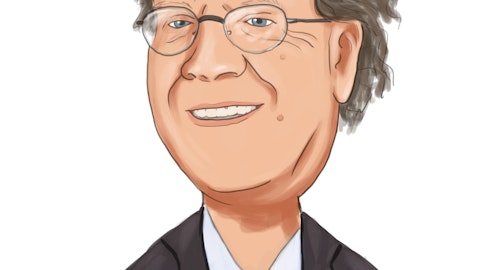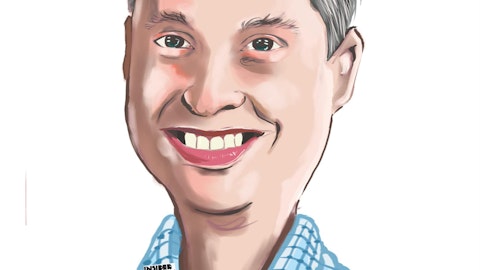NatsumuTsujino Mitsubishi: I Understand.
Operator: Thank you Tsujino. Now, over to Sasaki from Nomura Securities.
Futoshi Sasaki: I am Sasaki from Nomura Securities. Can you hear my voice okay?
Hitomaro Yano: Yes, we can hear you well.
Futoshi Sasaki: Thank you for the opportunity. I have two questions. The first, according to — I don’t think Yano has mentioned this. With regard to the new investment. So after the first quarter, there might be some, of course, positives and negatives. And also, you have mentioned about labor shortages. In the case of hotels, the luxury hot sales construction impact is proceeding in Japan and condominium price has been rising, too. So in terms of the timing — so with regard to first — the new investment, has there been any kind of strategy changes after the first quarter? Do you have any idea? Thank you very much. That’s the first question. And the second question, Robeco, the asset management side of your business. I suppose if you were to exclude the forex impact, AUM, I think it’s turning to them, I think, has decreased and the outflow of funds, I think, is continuing from last year.
And do you know anything about the notification of the cancellation? How do you foresee the development at the asset management companies?
Hitomaro Yano: So first of all, let me start with the new investment. This time, where it was just — it was the first quarter, and this is why. Now that I had, of course, paid the attention for the first quarter performance. And also the second quarter, how we foresee the second quarter, so this is why I have not made at all mention about the new investment. But the PE investment, we do have some actual outcome. We do have the actual case of new investments and real estate related, so it is capital recycling after all. So we have new development, and as for hotels and inns. So there were initial plan on our part, such as Suginoi in Oita, we had rebuilt the hotel, and that was quite sizable even during the period of the COVID-19 pandemic.
So we have been working on the development of our hotels. And how long the real estate, the boom may continue, but the construction cost is rising. So we need to turn cautious. We cannot, of course, continue to enjoy the heydays, that should not be the case. But we have, of course, been developing ourselves and we’ll be able to increase the value that way. So it means that we can always develop and hold as opposed to develop an exit. So we would like to continue that way. And going forward, on a much longer perspective, so at the time of the closing of the second quarter results, I suppose we’ll be able to share some examples of our PE investment. And to answer the second part of your question, Robeco and other asset management AUM, please, I think please refer to the numbers that appear on the material that we have provided to you.
We called it at data book. And we quoted as supplementary information for the three months ended June 30, 2023, that we disclosed. So we have furnished the bulletin report as well as the presentation material and also this supplementary information, and that 2023 shows the level of AUM. Unfortunately, in the second quarter, the net new money or the inflow of money was JPY2.9 billion of a decline. Page 23, but if you were to revert to the outstanding balance, 23 March end, JPY296.1 million and JPY305.1 billion thereafter. So in 2023, April to June, which means that we had increased the AUM at the end of the period. And the net new money was on decline as you can see from the chart on Page 21, and we have been covering it somewhat by the appreciation of the prices of the financial products.
But we would try to, of course, do whatever we can to increase the net new money going forward. So I hope this answers your question.
Futoshi Sasaki: Robeco, the asset class that you are struggling the most, is it alternative asset or equity or a bond? I’m not sure, to be honest.
Hitomaro Yano: Robeco, they are good at managing traditional financial products. So I think they would like to perhaps increase the alternative assets. So in other words, you are struggling with the traditional assets rather than anything new or newer. Robeco, and we had had covered Capital and Boston Partners. Those are the asset managers that we own. And the US harbor is struggling, so we are converting the win which the management has done to access for the company going forward.
Futoshi Sasaki: Thank you very much. I would like to perhaps ask you the further questions at a later stage. So over to the next person.
Operator: JPMorgan, Sato Koki. Yes.
Koki Sato: Yes. Can you hear me okay?
Hitomaro Yano: Yes. Continue.
Koki Sato: Thank you. I would like to ask you to give me some more explanation about the aircraft and ships. So in line with concession and real estate kind of recovery, do you expect — I want to understand that based on the trend. But also the ship were already included in the different quarters in the past, Avolon can be excluded but pure aircraft profit is difficult for us to see. So for example, on Page 13, this is the segment profit and the quarterly trend. Can you maybe give us more information about this so that we can see the breakdown of the aircraft trend for example? And excluding Avolon, just over JPY2 billion decline in profit is seen. And if you exclude the sales of marine vessels, what is the situation? Can you please explain this in a little bit more detail?




